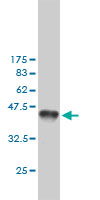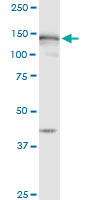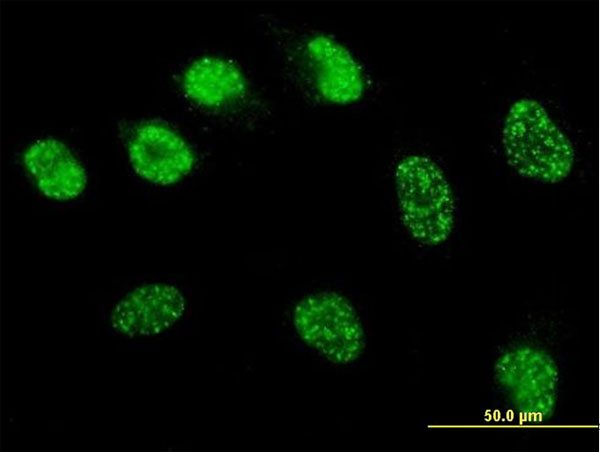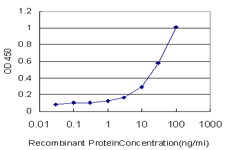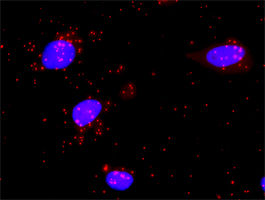MSH6 Antibody (monoclonal) (M01)
Mouse monoclonal antibody raised against a partial recombinant MSH6.
- 产品详情
- 实验流程
- 背景知识
Application
| WB, IF, E |
|---|---|
| Primary Accession | P52701 |
| Other Accession | NM_000179 |
| Reactivity | Human |
| Host | mouse |
| Clonality | monoclonal |
| Isotype | IgG1 kappa |
| Clone Names | 1F2 |
| Calculated MW | 152786 Da |
| Gene ID | 2956 |
|---|---|
| Other Names | DNA mismatch repair protein Msh6, hMSH6, G/T mismatch-binding protein, GTBP, GTMBP, MutS-alpha 160 kDa subunit, p160, MSH6, GTBP |
| Target/Specificity | MSH6 (NP_000170, 931 a.a. ~ 1030 a.a) partial recombinant protein with GST tag. MW of the GST tag alone is 26 KDa. |
| Dilution | WB~~1:500~1000 IF~~1:50~200 E~~N/A |
| Format | Clear, colorless solution in phosphate buffered saline, pH 7.2 . |
| Storage | Store at -20°C or lower. Aliquot to avoid repeated freezing and thawing. |
| Precautions | MSH6 Antibody (monoclonal) (M01) is for research use only and not for use in diagnostic or therapeutic procedures. |
For Research Use Only. Not For Use In Diagnostic Procedures.
Provided below are standard protocols that you may find useful for product applications.
BACKGROUND
This gene encodes a protein similar to the MutS protein. In E. coli, the MutS protein helps in the recognition of mismatched nucleotides, prior to their repair. A highly conserved region of approximately 150 aa, called the Walker-A adenine nucleotide binding motif, exists in MutS homologs. The encoded protein of this gene combines with MSH2 to form a mismatch recognition complex that functions as a bidirectional molecular switch that exchanges ADP and ATP as DNA mismatches are bound and dissociated. Mutations in this gene have been identified in individuals with hereditary nonpolyposis colon cancer (HNPCC) and endometrial cancer.
REFERENCES
Risk of urothelial bladder cancer in Lynch syndrome is increased, in particular among MSH2 mutation carriers. van der Post RS, et al. J Med Genet, 2010 Jul. PMID 20591884.Comprehensive screen of genetic variation in DNA repair pathway genes and postmenopausal breast cancer risk. Monsees GM, et al. Breast Cancer Res Treat, 2010 May 23. PMID 20496165.A Large-scale genetic association study of esophageal adenocarcinoma risk. Liu CY, et al. Carcinogenesis, 2010 Jul. PMID 20453000.One to 2-year surveillance intervals reduce risk of colorectal cancer in families with Lynch syndrome. Vasen HF, et al. Gastroenterology, 2010 Jun. PMID 20206180.MutSbeta exceeds MutSalpha in dinucleotide loop repair. Kantelinen J, et al. Br J Cancer, 2010 Mar 16. PMID 20160730.
终于等到您。ABCEPTA(百远生物)抗体产品。
点击下方“我要评价 ”按钮提交您的反馈信息,您的反馈和评价是我们最宝贵的财富之一,
我们将在1-3个工作日内处理您的反馈信息。
如有疑问,联系:0512-88856768 tech-china@abcepta.com.























 癌症的基本特征包括细胞增殖、血管生成、迁移、凋亡逃避机制和细胞永生等。找到癌症发生过程中这些通路的关键标记物和对应的抗体用于检测至关重要。
癌症的基本特征包括细胞增殖、血管生成、迁移、凋亡逃避机制和细胞永生等。找到癌症发生过程中这些通路的关键标记物和对应的抗体用于检测至关重要。 为您推荐一个泛素化位点预测神器——泛素化分析工具,可以为您的蛋白的泛素化位点作出预测和评分。
为您推荐一个泛素化位点预测神器——泛素化分析工具,可以为您的蛋白的泛素化位点作出预测和评分。 细胞自噬受体图形绘图工具为你的蛋白的细胞受体结合位点作出预测和评分,识别结合到自噬通路中的蛋白是非常重要的,便于让我们理解自噬在正常生理、病理过程中的作用,如发育、细胞分化、神经退化性疾病、压力条件下、感染和癌症。
细胞自噬受体图形绘图工具为你的蛋白的细胞受体结合位点作出预测和评分,识别结合到自噬通路中的蛋白是非常重要的,便于让我们理解自噬在正常生理、病理过程中的作用,如发育、细胞分化、神经退化性疾病、压力条件下、感染和癌症。
